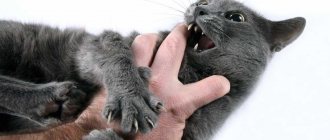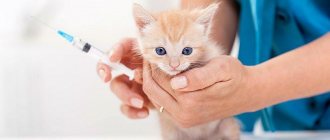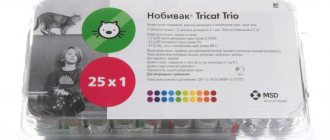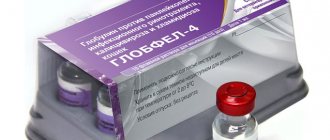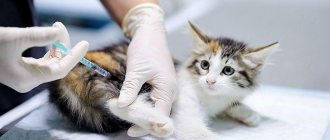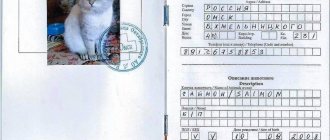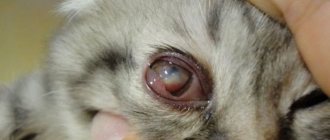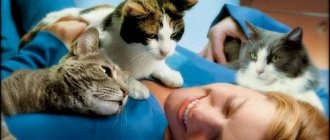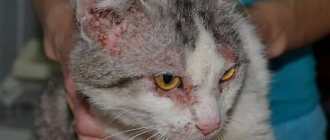Wanting to have a furry pet, many cat lovers prefer the British cat breed. These active kids are distinguished not only by their unusual color, but also by their “apartment” lifestyle. Such pets are rarely allowed outside and efforts are made to minimize their contact with other animals. That is why there is an opinion that vaccinations are absolutely unnecessary for a British kitten. Many owners of unusual pets are absolutely sure that if their pet constantly sits in the apartment, then it cannot catch any infection. However, as veterinary practice has shown, such an opinion is a misconception. Let's consider this topic in more detail.
Is it necessary to have vaccinations for a British kitten?
If a four-legged baby does not leave the premises, this does not mean that he is safe and cannot begin to suffer from serious illnesses. In this matter, it doesn’t matter what breed the kitten is. In any case, he is at risk of catching the virus and getting sick.
You need to understand that there are a huge number of infected animals roaming the streets, which can be carriers of dangerous bacteria. When a person enters an apartment, he automatically brings pathogenic microflora on his shoes and clothes. Of course, some kittens have no interest in jackets and boots. However, this does not mean that the pet is completely safe.
As a rule, immediately after returning home, the owner of the animal strokes the kitten that meets him. Human hands contain a huge amount of bacteria, so the owner of a furry ball can infect his pet with his own hands.
Another reason why vaccinations for a British kitten must be done is because of cats and rats, which often live in the basements of apartment buildings. These stray animals are carriers of dangerous diseases. Yes, kittens will not hunt rats, but they can come into contact with surfaces on which rodents have walked or on which traces of their vital activity remain. In this case, the chance of catching a viral disease is very high. And there is no need to rely on the fact that the pet does not cross the threshold of the apartment. You won't be able to keep an eye on him all the time. A nimble creature can easily sneak away if your child, say, does not close the door tightly. Or you yourself will bring the infection into the house with you, as mentioned above.
Why is there an entrance! An animal can pick up an infection even during a visit to the veterinarian. During the long wait in line, he will be in the same room with infectious relatives. In addition, not all doctors thoroughly wipe down tables after other patients.
There are also a number of reasons why vaccinations should still be given to a British kitten, even if the risk of infection in the fluffy one is minimized. Let's discuss the pros and cons of vaccination.
pros
In addition to a healthy existence, a kitten that has received all the necessary vaccinations has the opportunity to participate in exhibitions and go on long trips with its owner. If, while staying in a suburban area, he is scratched or bitten by a cat or dog, then his body will steadily endure a possible infection and will not allow it to spread.
If the owner of a purebred cat wants to continue his family, he must provide the appropriate documents, and only then begin breeding kittens.
However, in fairness, it is worth talking about some of the disadvantages of vaccinations.
What happens if you don't get vaccinated?
Vaccination is an important preventative procedure that minimizes the risk of contracting dangerous viruses and infections. Refusal to vaccinate an animal is like playing Russian roulette, which is especially true for cats that regularly visit the street.
If your pet never goes for a walk and does not come into contact with other animals, it is recommended to vaccinate against at least the three most dangerous infections transmitted by small rodents, birds and dust that settles on clothes, shoes and household items in the house.
A kitten can become infected with rabies only when the saliva of a sick animal gets into the blood of a healthy one. As a rule, this can only happen as a result of a bite from an infected cat or dog. If your cat never goes outside, the risk of contracting this deadly disease is fortunately negligible.
But we should not forget that cats are very dexterous, curious and brave animals. An accidentally unlocked door or an open window - and here it is, the long-awaited access to freedom. By running out into the street or even into the entrance, a pet can pick up an insidious infection that quickly develops into a deadly disease.
Whether your British cat needs vaccinations is up to you to decide! But remember, if you refuse to vaccinate your animal, you expose it to serious risks!
More articles on this topic:
Useful materials:
- Cutaneous horn General description of the disease Cutaneous horn on the forehead or face (ICD 10 code - L57.0) -...
- Itching and odorless discharge Main causesBefore considering the factors that provoke the appearance of discharge that has a sour odor, it is necessary to immediately note...
- Normal temperature in animals Normal temperature in different types of animals Veterinary services Day hospital for animals Veterinary certificates Vaccination…
- Discharge in women What kind of discharge between menstruation is considered normal? Female discharge normally consists of mucus from the cervical canal, dead...
Minuses
There is a tiny chance (less than 1%) that your kitten will suffer side effects after vaccination. Some babies experienced drowsiness, decreased activity and appetite. However, all these unpleasant consequences disappear in about a day.
In a particular case, a kitten may develop an allergic reaction to the drug that was administered to it. For example, swelling of the larynx, severe itching, vomiting and diarrhea may begin. Then you should contact a specialist as soon as possible.
Kitten's reaction to the vaccine
Immediately after your British cat's vaccination, the following changes may occur:
- there is lethargy, apathy and slowness in movements;
- excessive sleepiness of the animal;
- lack of appetite;
- allergic reactions are possible.
If kittens are vaccinated on time, the reaction indicated in the last paragraph is very rare. Since in most cases the cat tolerates vaccination easily. And after 6-7 hours or, in extreme cases, a day later, it returns to its previous state . If you still notice some symptoms (swelling of the throat), you should immediately contact a veterinarian.
What infections do cats suffer from?
The British are susceptible to the same infectious diseases as their other relatives.
Among them are:
- Hyperviral and calicivirus infections. In this case, the animal suffers from respiratory tract damage, conjunctivitis and joint problems.
- Panleukopenia. This disease is most often called feline distemper. The animal loses its appetite and begins to suffer from vomiting, diarrhea and severe thirst.
- Toxoplasmosis. Externally, this disease practically does not manifest itself in any way. Infection occurs if your pet eats raw meat. It is worth noting that this disease is dangerous not only for the four-legged pet, but also for all household members.
To prevent the occurrence of these dangerous diseases, as well as rabies, furry pets must be given appropriate injections. It remains to figure out when to vaccinate British kittens. It is also worth considering the possibility of vaccination at home.
Primary vaccination
If we talk about at what age British kittens should start getting vaccinated, it should be noted that in this case the breed does not play a special role. As a rule, primary vaccination is carried out when the baby is 2-2.5 months old. At this age, kittens have already fully developed internal organs, but the antibodies that the babies received with their mother’s milk no longer work and gradually dissolve in the blood.
Therefore, it is at this age that the first vaccinations are given to British kittens (and any others too). Vaccination helps animals strengthen their immune system. Of course, in this case, the kitten’s body receives a certain amount of the virus, but it is not capable of causing harm to the baby.
Features of vaccination among the British
The first vaccination should be done at 10-12 weeks, just when the pet has grown and become stronger. This vaccine can protect your cat from:
- calcivirosis;
- rhinotracheitis;
- panleukopenia.
This procedure must be repeated after 2-3 weeks and also add a rabies vaccination.
Regarding the British, their vaccination period is slightly different from other cats. The first vaccinations for British kittens are given at 8-9 weeks, the list of which is the same as for other cats. Re-vaccination is not carried out, as is rabies medicine, which is given much later.
The next stage is carried out already at 6-7 months, when the teeth change. Then the veterinarian carries out a revaccination, and if it is a British person, then he needs to be additionally vaccinated against rabies.
In an earlier period, vaccination is impossible, since teeth change at 4-6 months, which is why the animal’s body is weakened. If you do get vaccinated, complications may arise after it related to your pet’s health.
What vaccinations do British kittens get?
As a rule, primary vaccination involves the use of a complex of drugs against panleukopenia, rhinotracheitis and calicivirosis. Today, there are a huge number of vaccine manufacturers, but experts prefer the following brands:
- "Multifel". This is a domestically produced drug. The cost of the injection is approximately 280-300 rubles.
- "Falovax." The American drug will be more expensive and will cost about 700 rubles per shot.
- "Nobivak". This drug is manufactured in the Netherlands. The cost of one injection will be at least 500 rubles.
- "Quadricate". This French drug is considered the most expensive. For one injection you will have to pay at least 900 rubles.
Revaccination
So, we have already discussed what vaccinations are given to British kittens and at what age. As a rule, 21 days after the first injection, the procedure must be repeated. According to research, at this age, all maternal antibodies are completely eliminated from the kitten’s body, and it needs repeated stimulation.
It is best if the same drug is used for revaccination as for the primary vaccination.
Also, during the repeat procedure, an additional one is added to the standard set of drugs - for rabies.
Preliminary procedures
Before giving the kitten an injection, the animal must be given anthelmintic drugs. This could be prazicide or drontal, for example. The drugs are available both in tablet form and in the form of syrups. It is easiest to give kittens the syrup, since dosing the drug is much easier.
If the animal's stool turns out to be clean, then you can go to the veterinarian. Vaccination can be done 10 days after deworming.
But if helminths were found in the kitten, the drug can be given again only after 10 days. And only 10 days after giving the next dose of the drug, vaccination should be carried out.
You cannot vaccinate a sick animal, so you need to observe your pet’s behavior for at least three days. And if any deviations from usual behavior are noticed, then vaccination must be canceled.
How to prepare your four-legged pet for vaccination
It’s worth noting right away that the first vaccination for a British kitten is done only if it is absolutely healthy. Therefore, before the injection, you must first visit the veterinarian and make sure that the pet does not suffer from any illness.
A few weeks before vaccination, the kitten should be given an anthelmintic. This is necessary so that the furry baby begins to develop its own immunity. This will also help get rid of parasites if there are any.
First of all - timeliness
Having a purebred kitten is considered a painstaking task. And even if it is a British, Scottish Fold or a representative of another breed, it still requires proper attention. Therefore, timely vaccinations for the British are the key to a well-formed and healthy cat.
If Gary is correct in his belief that the inflammatory response is not protective but a symptom of an invasion occurring in secret, then vaccines are certainly not the friends we think they are. They are instead secret killers who work for the enemy while doctors and veterinarians unknowingly act as collaborators, and worse, we actually keep these pet owners and parents to unknowingly betray our loved ones.
Potentially, vaccines are the medical world's bombshell; are used to catapult invaders inside castle walls where they can lay waste to them without any of us realizing it. So, instead of viral viral diseases like influenza, measles, earworms and rubella, we let the viruses win anyway, but along with the onset of cancer, leukemia and other inflammatory or autoimmune diseases.
We invite you to familiarize yourself with: Colors of British cats photos and descriptions
Author of the article
Cats are vaccinated against the following diseases: panleukopenia, calicivirosis, rhinotracheitis, rabies, chlamydia. For this purpose, vaccines from Felovax (USA), Quadricat “Merial” (France) and Multifel-4 (Russia) are used.
Kittens are vaccinated either at the age of 2 to 3 months or after changing teeth at the age of 8 months.
The first vaccination is done 10 days after the kitten is given an anthelmintic drug (drontal, prazicide, etc.). These drugs come in both tablet and syrup form; I give syrup to small kittens, as it is easier to dose. If during worming you do not find any worms in the kitten’s feces, then you can get vaccinated. And if there were helminths, then after 10 days the drug must be given again, and only after another 10 days can you be vaccinated.
Usually, the first vaccination for kittens is done at the age of 10-12 weeks (the vaccination must be trivalent without rabies), followed by a booster vaccination after 21 days. Repeated vaccination is done with the same vaccine as the first vaccination. After the second vaccination, quarantine is maintained for 10-14 days - this is the period the kitten still spends in the nursery. And only after 14 days does he develop immunity and can move to a new home.
Rabies vaccination for kittens is done separately from vaccination against infectious diseases. And if your kitten will live in a house, will not have contact with other animals, and will not catch rats or mice, then it is better to vaccinate him against rabies after changing his teeth. Booster vaccinations are given every other year and repeated annually.
All kittens of our nursery are sold already vaccinated, as indicated in the veterinary passport, at the age of at least 3 months. I vaccinate kittens against infectious diseases with the Felovax vaccine (USA). This is an excellent vaccine and gives lasting immunity, but the British have a hard time accepting it. Therefore, 30-40 minutes before vaccination, I give them an injection of suprastin (for kittens in a dosage of 0.3 ml, and for adults 0.5 ml).
1. Antiseptics - they may be needed if your pet is injured or to treat the umbilical cord of newborn kittens.
- Boric acid, 3% solution
- Zelenka
- Potassium permanganate (potassium permanganate)
- Alcohol (if you need to disinfect something)
- Hydrogen peroxide
- Bandages, cotton wool, adhesive tape, cotton swabs, Vaseline.
2. From the “belly”:
- Phthalazole
- Activated carbon
- Probiotics (Zoonorm, Vetom 1.1, Bifidum SHCZ or human Bifidum-bacterin). They are given when kittens are weaned from a cat and transferred to natural food (meat, cream, etc.). For adult animals that eat only industrial feed, they are given 2 times a year in courses of 7-10 days for better intestinal function.
3. Anthelmintic drugs: any of the following. They should only be bought in pet stores - do not buy them in markets. Lots of fakes.
- Drontal in tablets for adults and in the form of a suspension for kittens
- kittens can still be given a sweet suspension of Prazicide.
4. If your pet is at the dacha in the summer, he needs the anti-flea drug “Frontline”. A few drops on the withers - and goodbye to fleas.
5. For the eyes:
- Herbal lotions with chamomile, calendula, St. John's wort or any of these herbs for preparing a decoction. This is in case you need to wipe your eyes.
- Eye drops Maxidin or Tsiprovet - if your miracle got into your eye with a claw while washing your face or something else.
- Children's tetracycline eye ointment is for more serious cases.
6. Tablets or herbal tea "Cat-Bayun" You can also buy homeopathic peas: bromine, palladium and ignace. This is for anxious cats and cats, and it can also be served a few days before the exhibition and at the exhibition itself, so that the animals do not get nervous. You can also buy “catnip” for this purpose.
7. If your pet attends exhibitions, then you will need immunostimulants Fosprenil, Immunofan or Ribotan to increase immunity; they are usually injected 3 days before the exhibition. And, to make the injection less painful, buy insulin syringes, preferably made in Poland.
8. During the molting period and from time to time, cats are given Malt-Soft hair removal paste.
9. Vitamins: for kittens from Gimpet - Baby Tabs, for adult cats "Brewers Yeast Excel 8 in1" - in tablets and "Gamavit" in ampoules for adult cats and kittens (it is given to weakened animals and cats before and during childbirth. It is also can be used as an immunostimulant).
10. Herbs: Chamomile, sage, oak bark (may be useful when teething), St. John's wort, nettle, bearberry, pomegranate peels (useful for diarrhea).
11. A rectal electronic thermometer and petroleum jelly are so that you can measure the cat’s temperature if necessary. Pipettes if you have to put eye drops and other medications if prescribed by a veterinarian.
A first aid kit is, of course, a necessary thing, but I hope that you won’t have to use it often. Health to you and your pets!
* Copying site materials is allowed only if there is an ACTIVE link to my site *
After vaccination
During this period, you need to carefully monitor your pet, or rather, its behavior. If your baby has a strange reaction, it is better to consult your doctor.
As already mentioned, after vaccination, British kittens may suffer from side effects - some weakness and drowsiness have been noticed. This is the norm. But if you notice a rash on your fluffy, swelling around the lips and eyes, itching, vomiting or diarrhea, then this may indicate an allergy to a specific drug. Contact a specialist urgently!
It is also worth considering that you should not relax after the first vaccination. If the baby feels well after the injection, this does not guarantee that he will endure the second procedure just as calmly.
The first two weeks after vaccinations will have to be quarantined. This means that you need to exclude any contact with other animals and carefully monitor yourself. It is imperative to wipe your feet after going outside. Also, don't forget to wash your hands. Bathing the animal during this period is strictly prohibited.
Vaccinations for cats at home
Some pet owners prefer to save some money and vaccinate themselves. You need to understand that these types of injections are different from the injection of vitamins under the skin. Therefore, you should not rely on video tutorials from the Internet in this matter.
It is also necessary to take into account that preparations for vaccines are stored under special conditions at a certain temperature. It is very difficult to achieve this at home. If even the slightest mistake is made during the vaccination process, this can be fraught with irreparable consequences for the animal. Therefore, you should not save 200-400 rubles on your pet’s health. It is better to trust specialists from a trusted veterinary institution.
